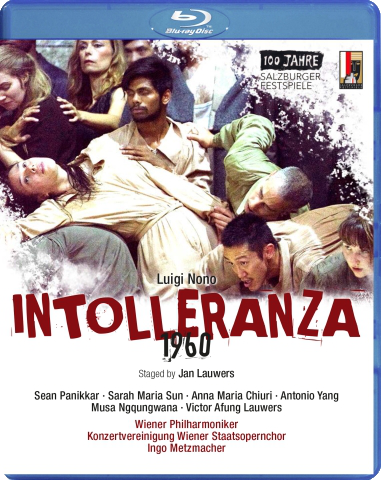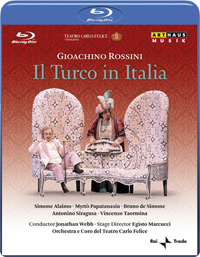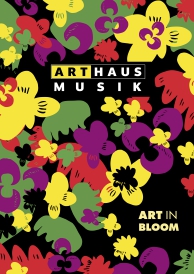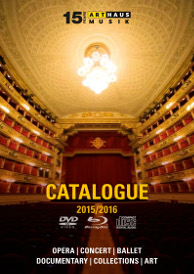
INTOLLERANZA 1960




INTOLLERANZA 1960
Soloists:
Sean Panikkar, Sarah Maria Sun, Anna Maria Chiuri, Antonio Yang, Musa Ngqungwana, Victor Afung Lauwers
Orchestra, Chorus:
Wiener Philharmoniker
Conductor:
Ingo Metzmacher
Director:
Jan Lauwers
Commissioned by the Salzburg Festspiele, Jan Lauwers was once again asked to take on a new staging. This time he will work on a contemporary opera, 'Intolleranza 1960' by Luigi Nono; an opera that is rarely performed. The Italian composer Luigi Nono (1924–1990) sought a new form of music theatre in which the voice, simultaneity and the spatial use of sound were examined and employed in a singular way. Nono wrote ‘Intolleranza 1960’, seen as his debut in the world of theatre, following a commission for the XXIVth International Festival of Contemporary Music at the Venice Biennale, where it had its premiere at Teatro La Fenice almost 60 years ago and was considered one of the most striking pieces of music in the history of the post-war avant-garde and a culminating work of Nono’s first artistic period. This production of ‘Intolleranza 1960’ for the centennial season of the Salzburg Festival is unique, not only for its content, but also because Nono’s oeuvre has been performed in Salzburg over the last 25 years in exemplary performances. With 'Intolleranza 1960', Jan Lauwers reinterprets the iconic work from 1961. The famous Nono expert Ingo Metzmacher takes on the musical leadership. Jan Lauwers' choice to perform this opera fits in with today's image of the times. His search for what art can mean in society and what political power art can convey is typical of this. Over the past two years, Jan Lauwers has been making an intensive study of the importance of political art, which will be reflected in this new staging. An international cast of performers, dancers, singers and musicians from all over the world like Sean Panikkar, Sarah Maria Sun, Anna Maria Chiuri and many other as well as the Wiener Philharmoniker took part in the most spectacular music theater production of the Salzburg Festival.
Including 56-minutes Documentary INTOLLERANZA - LUIGI NONO’S SCENIC ACTION AS SEEN TODAY by Bettina Ehrhardt
A award winning documentary by filmmaker Bettina Ehrhardt that traces the history of «Intolleranza 1960», a music-theatrical work with which Luigi Nono responded to the great political issues of his time: immigration and xenophobia, torture, industrial and natural catastrophes. Nono wanted to «bear witness» to his time – for him, music and political awareness were inseparable.
In the center of the action is the character of the immigrant, represented in the film by the African dancer Koffi Kôkô. In Venice in 1961 Intolleranza’s world première caused a scandal – people who witnessed it at the time recall what happened and discuss Nono’s æsthetic and political views. Among them : Nuria Schoenberg Nono, the soprano Catherine Gayer, the painter and set designer Emilio Vedova, the philosopher Massimo Cacciari and the composer Helmut Lachenmann, Nono’s pupil at the time. Nono’s humanism remains compelling : «The origin of my works is always to search within ‘human provocation’ : an event, an experience, a test of our life provokes my instinct and my conscience to give testimony as a human being and a musician.»
Including 56-minutes Documentary INTOLLERANZA - LUIGI NONO’S SCENIC ACTION AS SEEN TODAY by Bettina Ehrhardt
A award winning documentary by filmmaker Bettina Ehrhardt that traces the history of «Intolleranza 1960», a music-theatrical work with which Luigi Nono responded to the great political issues of his time: immigration and xenophobia, torture, industrial and natural catastrophes. Nono wanted to «bear witness» to his time – for him, music and political awareness were inseparable.
In the center of the action is the character of the immigrant, represented in the film by the African dancer Koffi Kôkô. In Venice in 1961 Intolleranza’s world première caused a scandal – people who witnessed it at the time recall what happened and discuss Nono’s æsthetic and political views. Among them : Nuria Schoenberg Nono, the soprano Catherine Gayer, the painter and set designer Emilio Vedova, the philosopher Massimo Cacciari and the composer Helmut Lachenmann, Nono’s pupil at the time. Nono’s humanism remains compelling : «The origin of my works is always to search within ‘human provocation’ : an event, an experience, a test of our life provokes my instinct and my conscience to give testimony as a human being and a musician.»
Label:
Arthaus Musik
Genre:
Opera & Documentary
Running Time:
85/56 mins
Picture Format:
16:9
Sound Format:
PCM Stereo 2.0
Number of Discs:
1
Region:
ABC
Languages:
IT; DE, EN (Documentary)
Subtitle Languages:
DE, EN, JP, KOR
EAN:
4058407094579
UPC:
4058407094579

Gioachino Rossini
Il Turco in Italia is one of Rossini‘s wittiest but most neglected works. It is full of ingenious and freshly composed invention. It is Rossini‘s fi rst collaboration with Felice Romani - Bellini‘s librettist - on this opera and Romani understood perfectly Rossini‘s love of pastiche and parody. He provided a commedia dell‘ arte scenario that gave(...)

Christoph Willibald Gluck
Gluck‘s wonderful but neglected 1774 opera Iphigénie en Tauride, inspired by the Greek legend, is treated with forceful and convincing simplicity in Klaus Guth‘s revolutionary production staged at the Zurich Opera House. The psychological drama in a tense atmosphere of fears and traumas is underlined by Guth‘s use of huge masks and(...)









 PDF Download (5,5 MB)
PDF Download (5,5 MB) PDF Download (6,7 MB)
PDF Download (6,7 MB)